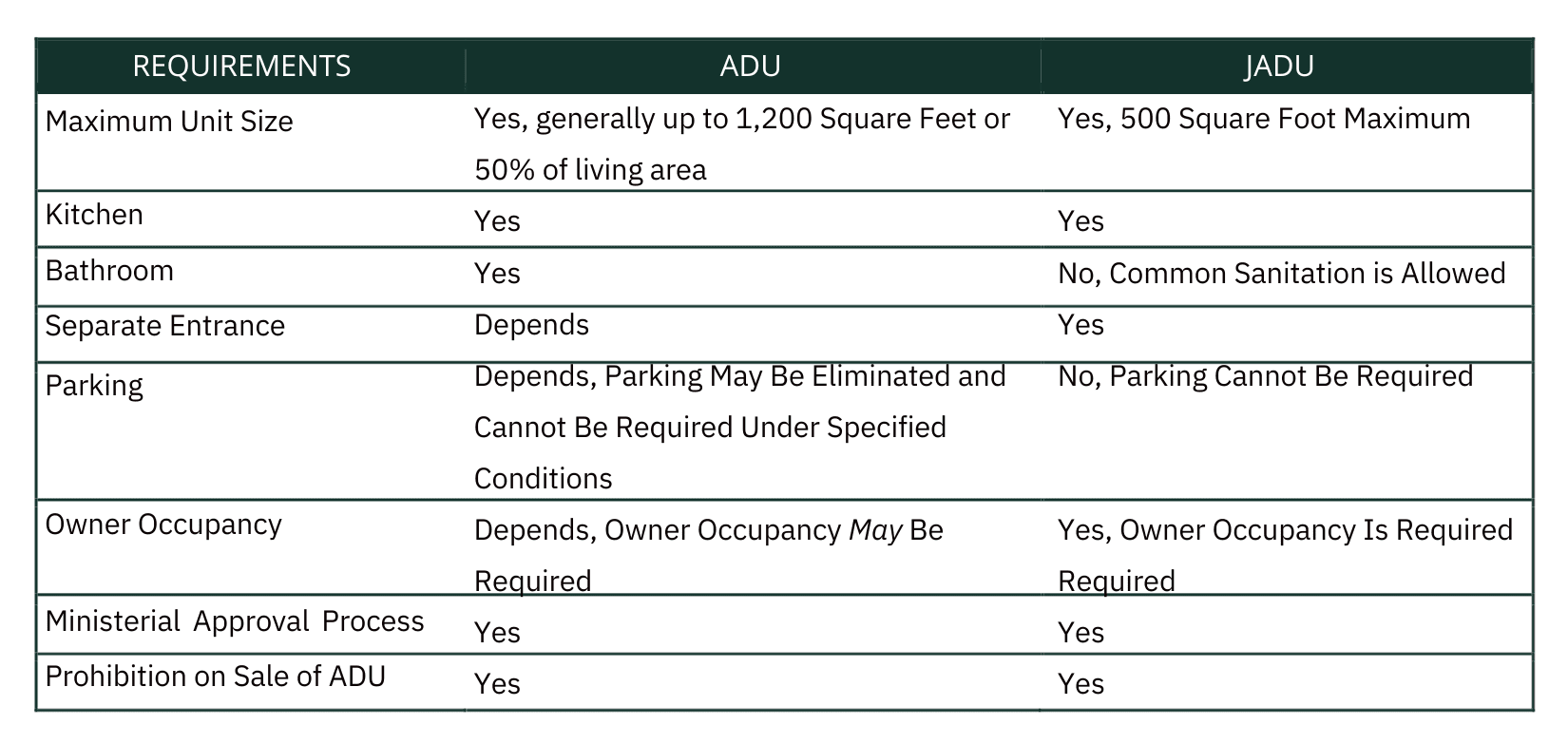Accessory Dwelling Units (ADUs) presents homeowners with an opportunity to enhance their property's value and functionality. An ADU is a separate living unit located on the same property as the main residence, and it comes with a multitude of benefits that can positively impact homeowners in various ways. In the realm of housing, particularly in California, the concepts of ADU and JADU (Junior Accessory Dwelling Unit) are gaining attention due to their potential to address housing needs.
Understanding JADUs and ADUs
Accessory Dwelling Units (ADUs): ADUs are separate living spaces typically built on the same property as a primary residence. They can be in the form of converted garages, detached structures, or even additions to existing homes. ADUs come in different sizes, ranging from studio apartments to full-fledged custom houses, and can be used for various purposes, such as housing elderly family members, generating rental income, or accommodating grown children.
Junior Accessory Dwelling Units (JADUs): JADUs are a subcategory of ADUs designed to be smaller and more integrated into the primary dwelling. They are typically created by converting a portion of the existing structure, like a bedroom or a part of the garage. JADUs are an excellent solution for homeowners with limited space or those who want to maintain a closer connection with their extended family while still providing them with an independent living area.
ADU and JADU - What is the difference?
ADUs can generally reach a size of up to 1,200 square feet or 50% of the existing living area, while JADUs have a capped maximum size of 500 square feet. Both options include a kitchen, but a JADU is not required to have a private bathroom; common sanitation facilities are allowed.
Let's dive into the advantages of ADUs and understand why homeowners are increasingly embracing this housing trend.
Increased Property Value
ADUs inherently add value to a property. By creating an additional dwelling unit, homeowners can potentially increase their property's market value, making it a more attractive investment for prospective buyers or renters. This increase in value can be particularly advantageous when it comes to selling the property or using it as collateral for loans.
Rental Income Stream
ADUs present an excellent opportunity for homeowners to generate rental income. Renting out the ADU allows homeowners to supplement their income, offset mortgage payments, or fund other investments. This additional revenue stream can significantly contribute to financial stability and improve the homeowner's overall financial standing.
Multigenerational Living
ADUs facilitate multigenerational living by providing a separate yet connected living space. Homeowners can accommodate family members such as adult children, elderly parents, or other relatives while ensuring privacy and independence. This is especially beneficial in culturally diverse societies where extended family living is common.
Tax Benefits
Some jurisdictions offer tax incentives or reductions for homeowners who build ADUs. These incentives can offset some of the construction costs, making the ADU a financially attractive proposition.
Flexibility and Versatility:
ADUs are versatile spaces that can serve various purposes. Homeowners can use them as guest houses, home offices, studios, or rental units. The flexibility to repurpose the ADU as per changing needs ensures that the space remains valuable and functional over time.
California Regulations and Zoning Laws
To successfully build a JADU or ADU in California, it's essential to familiarize yourself with the state's regulations and local zoning laws. Here are some key points to consider:
State Legislation: California has passed multiple bills, including SB 1069 and AB 2299, which have made it easier for property owners to build ADUs and JADUs. These bills have streamlined the permitting process and eased parking requirements.
Local Zoning Regulations: Local municipalities have the authority to establish their own rules regarding ADUs and JADUs. These rules can vary significantly from each jurisdiction. It's crucial to check with your local planning department for specific regulations and permitting requirements. Zoning laws dictate where ADUs and JADUs can be built, their size, and other design considerations. Some areas have restrictions on the number of ADUs that can be constructed on a single property.
Owner-Occupancy: Some local ordinances may require the property owner to live in either the primary residence or the ADU, which can impact your ability to rent out both spaces.
In conclusion, Accessory Dwelling Units offer a host of benefits for homeowners, ranging from financial gains to promoting sustainable living. As a flexible and practical housing option, ADUs are undoubtedly a wise and forward-thinking choice for homeowners seeking to enhance their property's value and functionality while positively impacting their lives and communities.
Helpful contact/resources:
Jonathan Chavez - Builder
310.382.6816
[email protected]
www.aspirelosangeles.com/agents/jonathan-chavez
Gabbi Sun - Architect
310.200.7300
www.vennstudiola.com
@vennstudio
Carl Smith - Architect
323.441.9070 x106
@telemachus_studio
Helpful links:
https://www.hcd.ca.gov/planning-and-community-development/housing-elements/building-blocks/accessory-dwelling-units
https://www.hcd.ca.gov/policy-research/docs/faqsadujr.pdf







